[SOLVED] About stores, vendors, suppliers, users and sites
Forum rules
Always add your Aimeos and PHP version as well as your environment (Linux/Mac/Win)
Spam and unrelated posts will be removed immediately!
Always add your Aimeos and PHP version as well as your environment (Linux/Mac/Win)
Spam and unrelated posts will be removed immediately!
- ЕвгенияСемихова(ИПСемиховаЕ.А.)
- Posts: 70
- Joined: 11 Jan 2025, 09:45
[SOLVED] About stores, vendors, suppliers, users and sites
Hello
Diving deeper and deeper into the Aimeos system, incomplete understanding accumulates due to differences with the management of systems that I have been used to working with for more than 15 years.
I have: Aimeos, ai-sites, ai-elastic, ai-customergroups
---
First, I'm trying to understand the algorithm of the system:
1) What does it mean "user-buyer" in the system? If the buyer registers on the site, it is created the site for him, right?
2) Is it possible to separate the registration forms for ordinary buyers and separately for the seller?
2.1) will I need to add a distinctive parameter that will distinguish the buyer from the seller?
3) If I create a new store from the admin panel, how do I link the seller to the created store? I mean how I can create store's owner?
3) If you analyze the site dropper.com - it has sellers = "supplier" on it. But I thought that in the concept of the Aimeos demo system, "suppliers" = brand, didn't I?
P.S.: if we analyze the demo version of Aimeos.marketplace, the seller (supplier) is located in the "Supplier" menu:
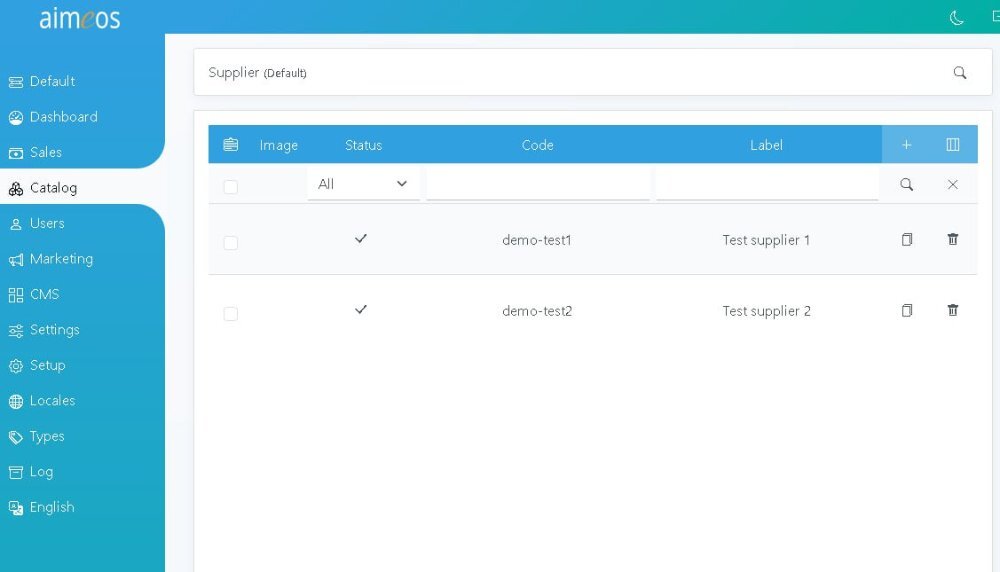
ok, I think: Brand name I can add in preferences by my self - is this right way?
Then, how I can link "supplier1" to "site1" store?
Diving deeper and deeper into the Aimeos system, incomplete understanding accumulates due to differences with the management of systems that I have been used to working with for more than 15 years.
I have: Aimeos, ai-sites, ai-elastic, ai-customergroups
---
First, I'm trying to understand the algorithm of the system:
1) What does it mean "user-buyer" in the system? If the buyer registers on the site, it is created the site for him, right?
2) Is it possible to separate the registration forms for ordinary buyers and separately for the seller?
2.1) will I need to add a distinctive parameter that will distinguish the buyer from the seller?
3) If I create a new store from the admin panel, how do I link the seller to the created store? I mean how I can create store's owner?
3) If you analyze the site dropper.com - it has sellers = "supplier" on it. But I thought that in the concept of the Aimeos demo system, "suppliers" = brand, didn't I?
P.S.: if we analyze the demo version of Aimeos.marketplace, the seller (supplier) is located in the "Supplier" menu:

ok, I think: Brand name I can add in preferences by my self - is this right way?
Then, how I can link "supplier1" to "site1" store?
Last edited by ЕвгенияСемихова(ИПСемиховаЕ.А.) on 07 Feb 2025, 07:39, edited 1 time in total.
Debian 12, PHP 8.3, Server 1 = Aimeos 2024.10.13, Server 2 = ES 8.17.1
life is full of many new and interesting things
life is full of many new and interesting things
Re: About stores, vendors, suppliers, users and sites
- Buyers don't register upfront (that's no implemented by default) and an account will be created for them at the end of the checkout process.ЕвгенияСемихова(ИПСемиховаЕ.А.) wrote: ↑04 Feb 2025, 10:33 1) What does it mean "user-buyer" in the system? If the buyer registers on the site, it is created the site for him, right?
2) Is it possible to separate the registration forms for ordinary buyers and separately for the seller?
2.1) will I need to add a distinctive parameter that will distinguish the buyer from the seller?
- In multi-vendor setups, sellers must register upfront and you need to set SHOP_REGiSTRATION=true in your .env file (see: https://github.com/aimeos/aimeos?tab=re ... lti-vendor)
Both of them are stored in the Laravel "users" table.
1). For SELLERS, a sub-site is created which is there shop area, contains their products, etc. and their account in the "users" table is linked to that sub-site (via the "users.siteid" column) and a group is assigned (usually "admin") so they can log into the admin backend.
2.) For buyers, NO sub-site is created, only a record in the "users" table and their value in "users.siteid" is empty
After creating the sub-site, switch to that sub-site using the site selector in the left navigation menu (first entry). Then, create a new user in Users > Customers (naming might be confusing here) and assign the "Administrator" group to that user.ЕвгенияСемихова(ИПСемиховаЕ.А.) wrote: ↑04 Feb 2025, 10:33 3) If I create a new store from the admin panel, how do I link the seller to the created store? I mean how I can create store's owner?
Yes, sellers are users while suppliers are brands, manufacturers, distributors or whatever you want to link to the products and they can contain texts and images. Suppliers are entities for adding addition information to products but don't have access to the Aimeos system at all.ЕвгенияСемихова(ИПСемиховаЕ.А.) wrote: ↑04 Feb 2025, 10:33 3) If you analyze the site dropper.com - it has sellers = "supplier" on it. But I thought that in the concept of the Aimeos demo system, "suppliers" = brand, didn't I?
Yes and only you or users with backend access.ЕвгенияСемихова(ИПСемиховаЕ.А.) wrote: ↑04 Feb 2025, 10:33 ok, I think: Brand name I can add in preferences by my self - is this right way?
Switch to the sub-site of the seller and then create the supplier entries for the products. Then, the suppliers are only available for that sub-site/seller.ЕвгенияСемихова(ИПСемиховаЕ.А.) wrote: ↑04 Feb 2025, 10:33 Then, how I can link "supplier1" to "site1" store?
Professional support and custom implementation are available at Aimeos.com
If you like Aimeos, give us a star
give us a star
If you like Aimeos,
- ЕвгенияСемихова(ИПСемиховаЕ.А.)
- Posts: 70
- Joined: 11 Jan 2025, 09:45
Re: About stores, vendors, suppliers, users and sites
Thanks! Now everything is really falling into his places in my head, and it starting to clear up in our minds.
My husband made a detailed adaptation for the Russian language and posted it at our forum to attract even more interest in your system. Our colleagues are already waiting for the finished our project, and if all will be everything works fine, they also think to order for themselves (they are not our competitors, they have another product area - agriculture and medicine). By the way, we were surprised that our well-known and large websites work on your system: Hoff.ru and Divan.ru - Very Impressive!
 . Indeed, on a repeat visit, the user will simply log in using the code sent to him. For the first time, this will be enough to launch our project, but I will write about it on the login form (there are many buyers who may not understand further actions):
. Indeed, on a repeat visit, the user will simply log in using the code sent to him. For the first time, this will be enough to launch our project, but I will write about it on the login form (there are many buyers who may not understand further actions):
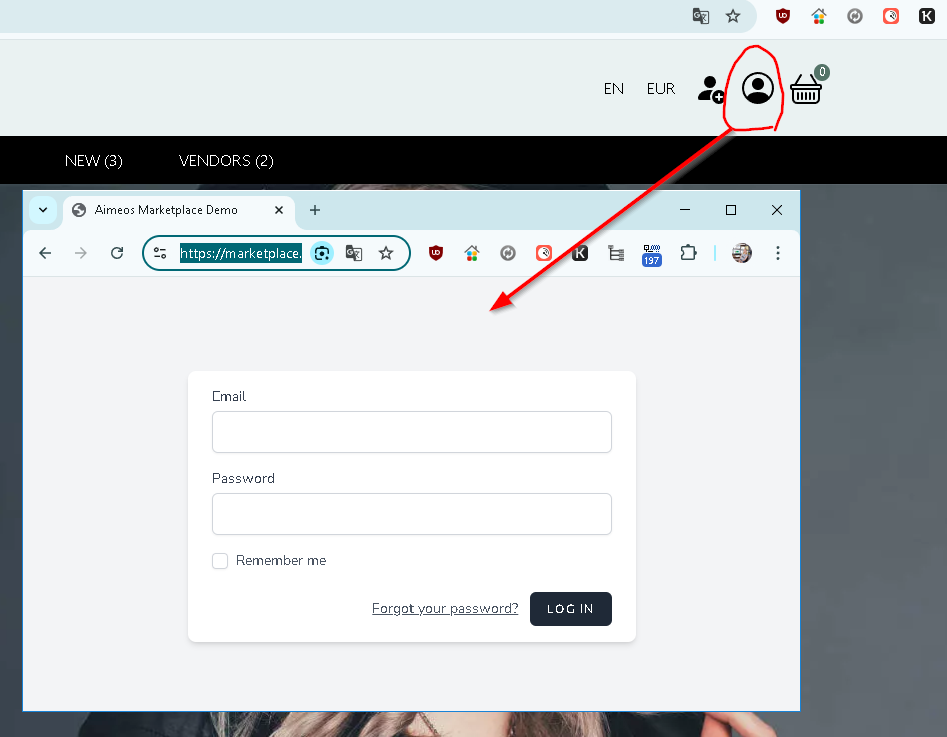
Question: if we leave this algorithm unchanged now, will we be able to easily add an authorization function in the future, for example via google, telegram or SMS?
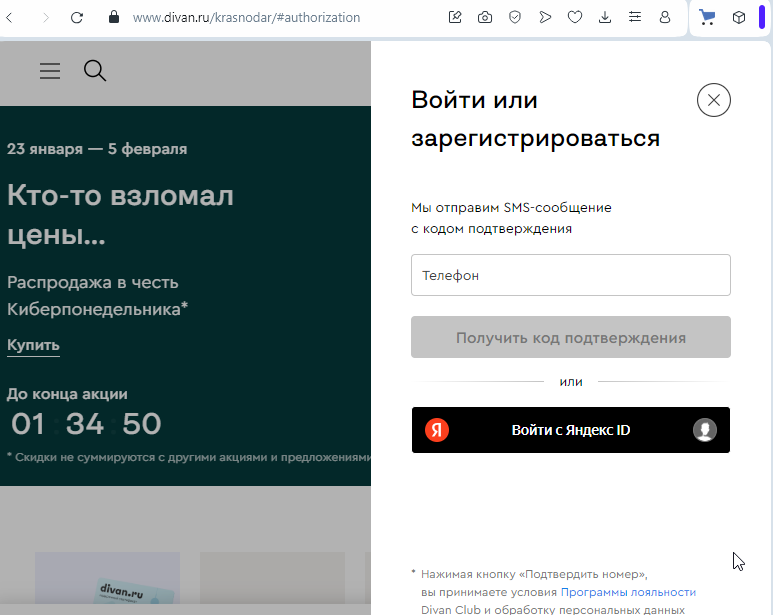
For example, by contacting you for help on a paid basis. In other words, existing customers at the time of the implementation of the new authorization will not suffer? Won't they lose their data, personal account, and order history?
---------------------------------------------------------
About Brands and Supplier (sorry, again)
I realized what had confused me. In the default implementation, it is valid: a brand is essentially a supplier. Ideally, the brand representative himself is the seller.

Well, how can I create a separate store (page) for each brand? That is, based on your demo:
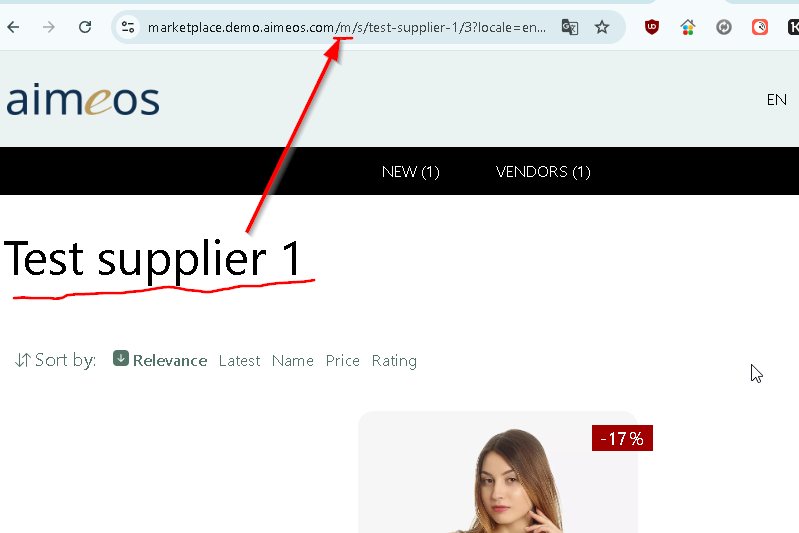
I mean: Brand 1 = store1.shop.com
Brand 2 = store2.shop.com
I need each individual vendor to have their own separate store (store_N.site.com ). But at the same time, it is also important to me that there are different manufacturer names.
Here, so as not to get confused, is the diagram:
Seller No. 1 = the name of the "Hardware store" - he can sell components manufactured by "Siemens" and "Schneider", as well as "Grundik".
Seller No. 2 = the name of the "Electronics store" - can also sell various products in his store, including "Siemens" and "Schneider" and others.
I want to achieve this in this way:
1) there is the "seller" entity - each seller has its own store, which is subordinate (nested in the hierarchy) to the main "default" store, for example "Ikea", "Leroy Merlin", "Ebay" ...
2) there is the "brand" entity - it is a manufacturer located far away and has nothing to do with the "seller", for example Siemens, Schneider, Volkswagen...
Thus, all entities #1 "seller" (different) can sell different entities #2 "brands" (different, without restrictions) on their individual stores (store_N.shop.com ). At the same time, all products from all subordinate stores should be displayed on the main "default" with the possibility of a single order processing (with conditional separation by store) - this is exactly what is done in your b2b demo. If I'm not mistaken, this is the scheme of operation No. 2 of the Marketplace extension.
So, at my project: Brands != Suppliers
How I can link "suppliers" to his own store? Like at taobao.com:

What for? So that you can describe the seller (his rating, the number of sales, how many years he has been selling, the type of seller: "supplier", "factory agent" or the "factory manufacturer" himself). There will be brands separately, but they have a small information load, mainly as a choice during filtering or in search.
In ideal we whant like this (I know, this is brand=supplier, but they have own store like we need):

P.S.: Sorry, I've been having a mess in my head for the last few months, I have to work during the day and develop my project based on your system at night.
My husband made a detailed adaptation for the Russian language and posted it at our forum to attract even more interest in your system. Our colleagues are already waiting for the finished our project, and if all will be everything works fine, they also think to order for themselves (they are not our competitors, they have another product area - agriculture and medicine). By the way, we were surprised that our well-known and large websites work on your system: Hoff.ru and Divan.ru - Very Impressive!
To be honest, I think it's simple and brilliant - no any botsBuyers don't register upfront (that's no implemented by default) and an account will be created for them at the end of the checkout process.

Question: if we leave this algorithm unchanged now, will we be able to easily add an authorization function in the future, for example via google, telegram or SMS?

For example, by contacting you for help on a paid basis. In other words, existing customers at the time of the implementation of the new authorization will not suffer? Won't they lose their data, personal account, and order history?
---------------------------------------------------------
About Brands and Supplier (sorry, again)
I realized what had confused me. In the default implementation, it is valid: a brand is essentially a supplier. Ideally, the brand representative himself is the seller.

Well, how can I create a separate store (page) for each brand? That is, based on your demo:

I mean: Brand 1 = store1.shop.com
Brand 2 = store2.shop.com
I need each individual vendor to have their own separate store (store_N.site.com ). But at the same time, it is also important to me that there are different manufacturer names.
Here, so as not to get confused, is the diagram:
Seller No. 1 = the name of the "Hardware store" - he can sell components manufactured by "Siemens" and "Schneider", as well as "Grundik".
Seller No. 2 = the name of the "Electronics store" - can also sell various products in his store, including "Siemens" and "Schneider" and others.
I want to achieve this in this way:
1) there is the "seller" entity - each seller has its own store, which is subordinate (nested in the hierarchy) to the main "default" store, for example "Ikea", "Leroy Merlin", "Ebay" ...
2) there is the "brand" entity - it is a manufacturer located far away and has nothing to do with the "seller", for example Siemens, Schneider, Volkswagen...
Thus, all entities #1 "seller" (different) can sell different entities #2 "brands" (different, without restrictions) on their individual stores (store_N.shop.com ). At the same time, all products from all subordinate stores should be displayed on the main "default" with the possibility of a single order processing (with conditional separation by store) - this is exactly what is done in your b2b demo. If I'm not mistaken, this is the scheme of operation No. 2 of the Marketplace extension.
So, at my project: Brands != Suppliers
How I can link "suppliers" to his own store? Like at taobao.com:

What for? So that you can describe the seller (his rating, the number of sales, how many years he has been selling, the type of seller: "supplier", "factory agent" or the "factory manufacturer" himself). There will be brands separately, but they have a small information load, mainly as a choice during filtering or in search.
In ideal we whant like this (I know, this is brand=supplier, but they have own store like we need):

P.S.: Sorry, I've been having a mess in my head for the last few months, I have to work during the day and develop my project based on your system at night.
Debian 12, PHP 8.3, Server 1 = Aimeos 2024.10.13, Server 2 = ES 8.17.1
life is full of many new and interesting things
life is full of many new and interesting things
Re: About stores, vendors, suppliers, users and sites
Aimeos uses the Laravel authentication framework so you can use any available Laravel package that extends authentication to use e.g. like social login or what else is available.ЕвгенияСемихова(ИПСемиховаЕ.А.) wrote: ↑05 Feb 2025, 16:55 Question: if we leave this algorithm unchanged now, will we be able to easily add an authorization function in the future, for example via google, telegram or SMS?
No, the Laravel users table may be extended but data not removed and that's also not the case for other tables.ЕвгенияСемихова(ИПСемиховаЕ.А.) wrote: ↑05 Feb 2025, 16:55 For example, by contacting you for help on a paid basis. In other words, existing customers at the time of the implementation of the new authorization will not suffer? Won't they lose their data, personal account, and order history?
Yes, you may use it like that.ЕвгенияСемихова(ИПСемиховаЕ.А.) wrote: ↑05 Feb 2025, 16:55 I realized what had confused me. In the default implementation, it is valid: a brand is essentially a supplier. Ideally, the brand representative himself is the seller.
Let's use a common wording:ЕвгенияСемихова(ИПСемиховаЕ.А.) wrote: ↑05 Feb 2025, 16:55 Well, how can I create a separate store (page) for each brand? That is, based on your demo:
I mean: Brand 1 = store1.shop.com
Brand 2 = store2.shop.com
I need each individual vendor to have their own separate store (store_N.site.com ). But at the same time, it is also important to me that there are different manufacturer names.
Here, so as not to get confused, is the diagram:
Seller No. 1 = the name of the "Hardware store" - he can sell components manufactured by "Siemens" and "Schneider", as well as "Grundik".
Seller No. 2 = the name of the "Electronics store" - can also sell various products in his store, including "Siemens" and "Schneider" and others.
I want to achieve this in this way:
1) there is the "seller" entity - each seller has its own store, which is subordinate (nested in the hierarchy) to the main "default" store, for example "Ikea", "Leroy Merlin", "Ebay" ...
2) there is the "brand" entity - it is a manufacturer located far away and has nothing to do with the "seller", for example Siemens, Schneider, Volkswagen...
- Seller: Company selling items and owning a store in Aimeos
- Store: Sub-site in Aimeos for the seller where they manage their own products
- Brand: Manufacturer like Siemens, Volkswagen, etc.
- Aimeos Supplier entry: The brand/manufacturer
- Buyer: A customer buying items in the marketplace or the seller stores directly
Each store owner can add as many supplier items for different manufacturers as they need. If you have a set of standard manufactures sold by many suppliers, you can also create the supplier items at the marketplace level and they are inherited to the vendor stores.
This is the marketplace mode with inheritance and aggregation (sitelevel = 3).ЕвгенияСемихова(ИПСемиховаЕ.А.) wrote: ↑05 Feb 2025, 16:55 Thus, all entities #1 "seller" (different) can sell different entities #2 "brands" (different, without restrictions) on their individual stores (store_N.shop.com ). At the same time, all products from all subordinate stores should be displayed on the main "default" with the possibility of a single order processing (with conditional separation by store) - this is exactly what is done in your b2b demo. If I'm not mistaken, this is the scheme of operation No. 2 of the Marketplace extension.
This should be all in the site item (store of the seller) and fields for rating information is already there. For other data, you need to add separate columns in the mshop_local_site table.ЕвгенияСемихова(ИПСемиховаЕ.А.) wrote: ↑05 Feb 2025, 16:55 How I can link "suppliers" to his own store? Like at taobao.com:
What for? So that you can describe the seller (his rating, the number of sales, how many years he has been selling, the type of seller: "supplier", "factory agent" or the "factory manufacturer" himself). There will be brands separately, but they have a small information load, mainly as a choice during filtering or in search.
Professional support and custom implementation are available at Aimeos.com
If you like Aimeos, give us a star
give us a star
If you like Aimeos,
- ЕвгенияСемихова(ИПСемиховаЕ.А.)
- Posts: 70
- Joined: 11 Jan 2025, 09:45
Re: About stores, vendors, suppliers, users and sites
Now I get it. We will simply add a link to the store of this seller near of the brand.This should be all in the site item (store of the seller) and fields for rating information is already there. For other data, you need to add separate columns in the mshop_local_site table.
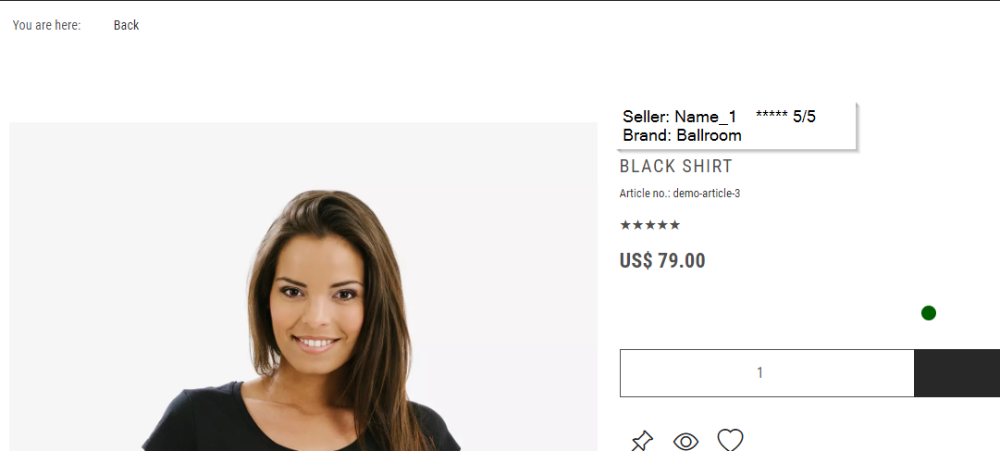
Thanks again for your precious help!
Debian 12, PHP 8.3, Server 1 = Aimeos 2024.10.13, Server 2 = ES 8.17.1
life is full of many new and interesting things
life is full of many new and interesting things
Re: [SOLVED] About stores, vendors, suppliers, users and sites
Correct. The Aimeos Berlin theme has that already included.
Professional support and custom implementation are available at Aimeos.com
If you like Aimeos, give us a star
give us a star
If you like Aimeos,